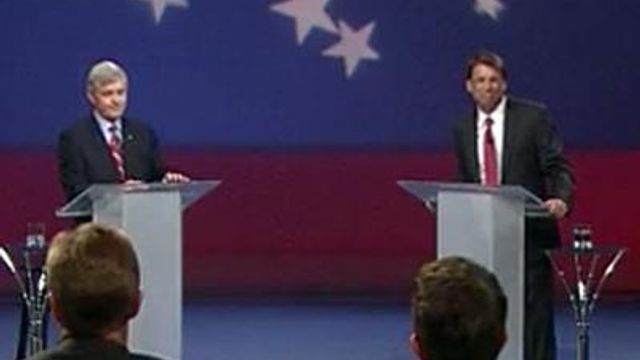Dalton gambles on attack strategy
Lt. Gov. Walter Dalton used the first gubernatorial debate to take aim at Republican Pat McCrory's record on taxes, education and civil rights. The former Charlotte mayor brushed off the attacks as "sad."
Posted — Updated"I tried to expose his record," Dalton said after the first of three televised debates the two men are scheduled to hold this fall.
For his part, McCrory adopted the stance of someone who expected to remain ahead in both the polls and fundraising, brushing off the Democrat's criticism.
"I had to correct some facts," McCrory dead-panned after the hour-long exchange held at UNC-TV's studios in the Research Triangle Park.
"Since McCrory is so far ahead, he doesn't have any incentive to take any risks," said Eric Heberlig, a political science professor at the University of North Carolina at Charlotte. Dalton, he said, had the far bigger challenge.
"The only way to change the dynamics if your opponent is ahead, is you have to convince people who are leaning in his direction that they've made the wrong decision and need to reconsider," Heberlig said. Going on the attack in a debate is generally viewed as a risky strategy, he said. Given the poll numbers, Dalton may have had no choice, Heberlig said.
Dalton criticized McCrory, raising questions about his tax returns and criticizing his education plans. The Democrat also questioned why McCrory hasn't released his tax returns, a challenge he and allied groups have raised throughout the campaign.
"I paid what was required by the IRS, and I have never been questioned," McCrory said.
The two men split on "fracking," the shorthand name giving to exploring for natural gas through horizontal drilling and hydraulic fracturing. Dalton expressed doubts the gas industry would ever be very profitable in North Carolina. McCrory said it should be up to the private sector to search for gas and make that decision.
"Spoken like someone who represents big oil," Dalton said, again recycling a campaign charge that McCrory's law firm represents the American Petroleum Institute. McCrory shrugged off the criticism.
When McCrory went on the attack, it was to link Dalton to incumbent Gov. Bev Perdue, a fellow Democrat who opted not to run for re-election among dismal poll numbers.
"There is only one person up here that has proposed new taxes," McCrory said, referring to Dalton's support for a 0.75-cent sales tax increase proposed by Perdue.
"That YouTube ad is not something that's going to bring people together," McCrory said. He referred to his volunteer work with underprivileged children, saying he did it not to score political points but because it was the right thing to do.
Dalton said the ad spoke not just to race, but the needs of economically disadvantaged North Carolinians throughout the state.
"If he finds this offensive, it is because he has offended," Dalton said. The Democrat said it was McCrory who raised the race issue by featuring former Wilson County Sheriff Wayne Gay in a campaign commercial. Gay has suggested in the past that he lost his post because of racially motivated voting.
"Are you talking about me now, or someone else?" McCrory said, interjecting over the objections of the moderator. He called Dalton's response "a sad commentary." It was the first time all night that McCrory's emotions bled through his calm and sometimes nonchalant delivery.
After the debate, McCrory was asked to elaborate on what he found wrong with the ad.
"I've responded as much as it deserves," McCrory said as he walked away.
Davidson College political science professor Susan Roberts questioned the wisdom of that ad during a conversation before the debate.
"I thought it was a very poor choice," she said. "He would be well-advised not to put any version of that on television."
Dalton's campaign said there are plans for a 30-second version of the ad, and Dalton himself doubled down on the criticism it presented when speaking to reporters after the debate.
"I think the ad speaks for itself," Dalton said. Referring to the leaders who appeared in the ad, Dalton said,"There are people who wanted to be heard on that."
If the strategy is a risk as Roberts said, it may be aimed at closing a specific gap. While recent polls show 89 percent of more black voters backing Barack Obama for president, Dalton's support lags the president by more than 15 percentage points among that demographic.
It's unclear how much impact the debate will have on the race. Dalton and McCrory finished their face-off an hour before presidential candidates Mitt Romney and Obama took to the air in their own debate. An informal survey of WRAL Facebook fans showed 71 percent had already settled on a choice in the governor's race.
Roberts and Heberlig said that national debate may drown out the coverage of the gubernatorial debate.
Asked how he would rate his performance, Dalton demurred.
"The people will grade us on Nov. 6," he said.
• Credits
Copyright 2024 by Capitol Broadcasting Company. All rights reserved. This material may not be published, broadcast, rewritten or redistributed.






